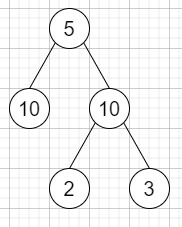
 Data Structure
Data Structure Networking
Networking RDBMS
RDBMS Operating System
Operating System Java
Java MS Excel
MS Excel iOS
iOS HTML
HTML CSS
CSS Android
Android Python
Python C Programming
C Programming C++
C++ C#
C# MongoDB
MongoDB MySQL
MySQL Javascript
Javascript PHP
PHP
- Selected Reading
- UPSC IAS Exams Notes
- Developer's Best Practices
- Questions and Answers
- Effective Resume Writing
- HR Interview Questions
- Computer Glossary
- Who is Who
Equal Tree Partition in C++
Suppose we have a binary tree with n nodes, our task is to check whether it's possible to partition the tree to two trees which have the equal sum of values after deleting exactly one edge on the original tree.
So, if the input is like

then the output will be true.
To solve this, we will follow these steps −
Define one stack st
Define a function solve(), this will take node,
-
if node is null, then −
return 0
leftSum := solve(left of node)
rightSum := solve(right of node)
curr := val + leftSum + rightSum of node
insert curr into st
return curr
From the main method do the following −
solve(root)
totalSum := top element of st
delete element from st
-
while (not st is empty), do −
x := top element of st
delete element from st
y := totalSum - x
-
if x is same as y, then −
return true
return false
Example
Let us see the following implementation to get a better understanding −
#include <bits/stdc++.h>
using namespace std;
class TreeNode{
public:
int val;
TreeNode *left, *right;
TreeNode(int data){
val = data;
left = NULL;
right = NULL;
}
};
class Solution {
public:
stack <int> st;
int solve(TreeNode* node){
if (!node)
return 0;
int leftSum = solve(node->left);
int rightSum = solve(node->right);
int curr = node->val + leftSum + rightSum;
st.push(curr);
return curr;
}
bool checkEqualTree(TreeNode* root) {
solve(root);
int totalSum = st.top();
st.pop();
while (!st.empty()) {
int x = st.top();
st.pop();
int y = totalSum - x;
if (x == y)
return true;
}
return false;
}
};
main(){
Solution ob;
TreeNode *root = new TreeNode(5);
root->left = new TreeNode(10);
root->right = new TreeNode(10);
root->right->left = new TreeNode(2);
root->right->right = new TreeNode(3);
cout<<(ob.checkEqualTree(root));
}
Input
TreeNode *root = new TreeNode(5); root->left = new TreeNode(10); root->right = new TreeNode(10); root->right->left = new TreeNode(2); root->right->right = new TreeNode(3);
Output
1

